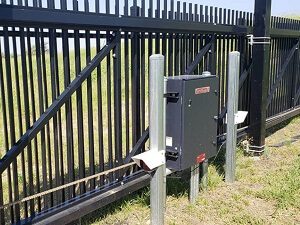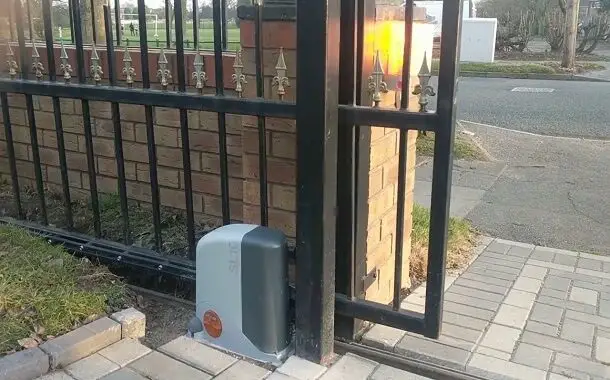How Much Do Electric Gates Cost?
Last Updated on February 8, 2024
Written by CPA Alec Pow | Content Reviewed by ![]() CFA Alexander Popinker
CFA Alexander Popinker
Installing an electric gate can provide increased security and convenience for your residential or commercial property. But these beautiful automated driveway gates come at a cost..
In this article, we’ll break down the price range you can expect for electric gate systems based on the different factors that influence overall cost.
How Much Do Electric Gates Cost?
The total price to install electric gates ranges from $3,000 to $15,000 on average. The cost depends on the type of gate, size, materials, special features, labor, and more. Custom luxury gates can cost over $25,000.
Basic aluminum electric gates start around $3,000 installed. More durable steel or wrought iron gates cost $5,000 to $8,000. And large commercial electric gate systems run $10,000 to $15,000.
According to Fixr.com, for example, the average cost of materials for different types of electric gates, not including installation, is as follows:
- Vinyl: $750 – $5,600
- Wood: $850 – $8,500
- Stainless Steel: $1,150 – $8,500
- Wrought Iron: $1,150 – $8,600
- Aluminum: $2,350 – $8,600
The residential electric gate cost by opening mechanism ranges from $1,050 to $9,000, with the average cost of installation falling between $2,500 and $5,500.
All Security Equipment writes that the cost of a new electric gate can range from $730 to $11,000, depending on the size, weight, material, and type of gate.
Installation fees can range from $1,500 to $3,000, and the final cost is affected by factors such as the type of opener, size, length, weight of the gate, and how the gate opens.
HomeAdvisor notes that the cost of installing an electric driveway gate typically ranges from $876 to $3,828, with an average cost of $2,343, not including the automatic gate opener. Automatic gate motors come in complete opener kits priced at $850 to $4,500 and are designed for specific gate styles and sizes.
Lawnstarter mentions that the cost to install an automatic driveway gate is affected by the material used. For example:
- Vinyl gates: $475 – $3,300
- Wood gates: $575 – $6,250
- Aluminum gates: $2,175 – $6,300
- Steel gates: $600 – $4,000
The average installation of an automatic driveway gate costs between $820 and $3,328.
Let’s look at the factors that determine the overall investment for your electric gate installation project.
Factors Affecting the Cost of Electric Gates
Several important considerations affect how much you’ll pay to install electric gates. The main factors include:
- Gate size and type: Larger gates and sliding gates cost more than smaller swing gates.
- Materials: Gates made of wrought iron, steel, or wood are more expensive than aluminum.
- Customization and design: Unique gate designs or embellishments add to the total cost.
- Gate opener and power: Automated openers and power supply wiring add a few thousand dollars.
- Labor and installation: Hiring a professional gate company involves labor charges.
- Access control system: Advanced technologies like keypads, remotes, and cameras cost extra.
- Maintenance: Expect ongoing annual maintenance fees for repairs or system checks.
Understanding these cost factors will help you budget realistically and plan your dream gate within your budget.
What Does Gate Installation Cost Include?
The total price of your electric gate installation will include:
- Gate construction materials and fabrication
- Gate design, size, and features
- Automated gate opener system
- Required wiring and power supply
- Access control systems (keypad, remotes, etc.)
- Permits for construction
- Professional installation labor
- Site preparation and post installation
Additional costs may apply for existing fence removal, extended power wiring, or special safety features. Maintenance and repair expenses should also be budgeted annually after installation.
Installation & Labor Cost for Automatic Driveway Gates
The bulk of the total cost for an electric gate installation comes from professional labor. Skilled technicians complete the installation, setup the automated systems, and integrate power and access controls.
For a basic electric gate installation, labor typically costs $1,500 to $3,000. More complex projects with additional safety features or accessories can drive labor above $5,000.
You might also like our articles about the cost of a garage door opener, an electric fence, and Acoustifence.
DIY installation is possible for savvy homeowners but comes with added risks and is best left to professionals.
Electric Gate Opener System Costs
The gate opener motor and mechanisms that automate and open/close the gates automatically start around $800 to $2,500 installed. Higher-end openers with backup batteries or special safety features can cost over $3,000.
Wiring the necessary electrical supply to power the opener and gates requires an additional $500 to $1,500 in most cases. New panel wiring or long conduit runs can increase power costs.
How Much Do Materials Impact Electric Gate Prices?
The materials used for constructing the gates themselves represent a significant portion of the project budget. The most popular options include:
- Aluminum gates: $2,000 to $4,000 for materials
- Steel or wrought iron gates: $3,500 to $6,000 for materials
- Wood gates: $3,000 to $7,000 for materials
- Vinyl gates: $1,500 to $3,500 for materials
Wrought iron and steel are the strongest and most secure options. Wood gates provide a classic, elegant look. And aluminum is lightweight, rust-resistant, and the most affordable choice.
Expect premium pricing for specialty materials like brushed bronze, powder coated finishes, or stainless steel. The material costs scale up for larger gate sizes or dual gate designs.
Electric Sliding Gate vs Swing Gate Costs
Sliding gates move along a track while swing gates pivot open. Swing gates take up less space and tend to cost $1,500 to $2,000 less than sliding gates.
But sliding gates can handle larger widths up to 50 feet across. The more massive automated mechanisms for sliding gates come at a $3,000 to $5,000 premium compared to swing gates.
Is DIY Installation Less Expensive?
 Some homeowners choose to install their own electric gates to potentially save on labor costs. But DIY gate installation has risks.
Some homeowners choose to install their own electric gates to potentially save on labor costs. But DIY gate installation has risks.
Without proper experience, you may choose subpar equipment, have safety issues, or end up with gates that don’t function consistently. You also take on the liability if someone gets injured by a self-installed gate.
In most cases, paying $2,000 to $4,000 for professional installation is worth it for electric gates done right.
Access Control Systems Add Cost
For added security and access control, most electric gate systems incorporate keypads, wireless remotes, or even smart home integration.
Basic keypad or remote clicker systems cost $500 to $1,500 installed. Adding video cameras, intercom systems, or smart home platforms can cost $2,500 to $4,000 or more.
Access control systems require their own wiring, power, and integration labor during installation. But they provide convenient and versatile gate access control.
Accounting for Ongoing Maintenance Fees
Once your electric gate system is installed, periodic maintenance is required to keep it functioning properly.
A basic annual maintenance service typically costs $200 to $300. This includes testing safety systems, adjusting mechanisms, and checking for any worn parts.
You may also need to budget for occasional repairs like opener motor replacements or wiring fixes that could run $500 to $1,000.
Proactive maintenance and upkeep is essential for maximizing the longevity of your investment.
Important Budget Factors for Your Electric Gate
As you plan for an electric gate installation, keep these budgeting factors in mind:
- Get multiple quotes to compare pricing between companies.
- Allow for 20% extra as a buffer for unforeseen costs.
- Focus on quality over cutting corners to save money.
- Financing can help make electric gates more affordable.
- Maintenance fees are required to protect your investment.
Investing in electric gates adds tremendous value and security to a property when done properly. With smart planning and budgeting, you can install high-quality automated gates tailored to your needs and budget.
Final Words
Installing electric gates requires careful planning and budgeting to get the features you want at a fair price. While costs can add up quickly, the long-term benefits of increased security, convenience, and curb appeal make the investment worthwhile.
Focus first on quality gates that match your home’s aesthetics. Then add the technology features that best meet your access control and functionality needs. With the right electric gate system and professional installation, you’ll enjoy the benefits of automated gates for decades to come.
Frequently Asked Questions
How Much Does It Cost to Run an Electric Gate?
The cost to run and operate an electric gate depends on the power requirements and how often it’s used. Here are some estimates for ongoing electric gate operation:
- Electricity: $10 – $30 per month
- Battery replacement: $100 – $200 every 2-3 years
- Lubrication: $30 – $60 per year
- Service checks: $100 – $250 annually
So for a typical electric gate, expect to budget $250 – $500 in annual operating and maintenance costs.
The gate opener motor uses the most significant power. Basic gate openers consume around $15 – $25 in electricity monthly. More heavy-duty or frequent gate cycles can cost up to $30 – $50 monthly.
Solar-powered openers avoid ongoing electricity usage but require replacing batteries every few years. The gate’s size and construction materials have little impact on energy use.
Regular lubrication of gate hinges and opener mechanisms is needed, usually annually at $30 – $60. Annual preventative service checks cost $100 – $250 depending on the company and involved testing.
Overall, electric gates are relatively affordable to run year-to-year. But do budget for regular maintenance and component replacements as needed. Proper care ensures your electric gate system runs smoothly for many years.
What Is the Cheapest Electric Gate?
The most affordable automated gate option is a lightweight aluminum swing gate paired with a low-end gate opener. Here are some ways to save on an electric gate:
- Choose smaller, single swing gates instead of large, dual gates
- Use simple aluminum construction instead of wood, iron or steel
- Opt for chain drive openers rather than belt drives
- Purchase low-profile flat-track openers
- Avoid fancy decorative add-ons and intricate designs
- Install a simple keypad system instead of intercoms or smart home integration
- Opt for solar power instead of hardwiring if possible
Overall, basic aluminum swing gates with budget openers provide home security automation at the lowest cost. Prioritize quality equipment over cutting too many corners, as cheapest doesn’t always mean best value. ButShop around to find reputable brands that offer reliability without paying premium prices.
What Are the Disadvantages of Electric Gates?
While electric gates provide convenience and security, some potential drawbacks include:
- High upfront installation costs, averaging $3,000 to $15,000
- Ongoing maintenance and repair expenses
- Higher risk of mechanical failure or malfunction when compared to manual gates
- Possibility of gates opening or closing accidentally
- Safety hazards if not installed correctly
- Loss of power affects gate functionality
- Can detract from home’s aesthetics if low quality
Safety should be the top concern with automated gates. Required safety features like infrared sensors, pinch guards, and rollback detection minimize risks.
Overall, electric gates improve security and access control if installed properly by a professional. But the complexity does necessitate diligent maintenance and safety awareness.


Leave a Reply
Want to join the discussion?Feel free to contribute!